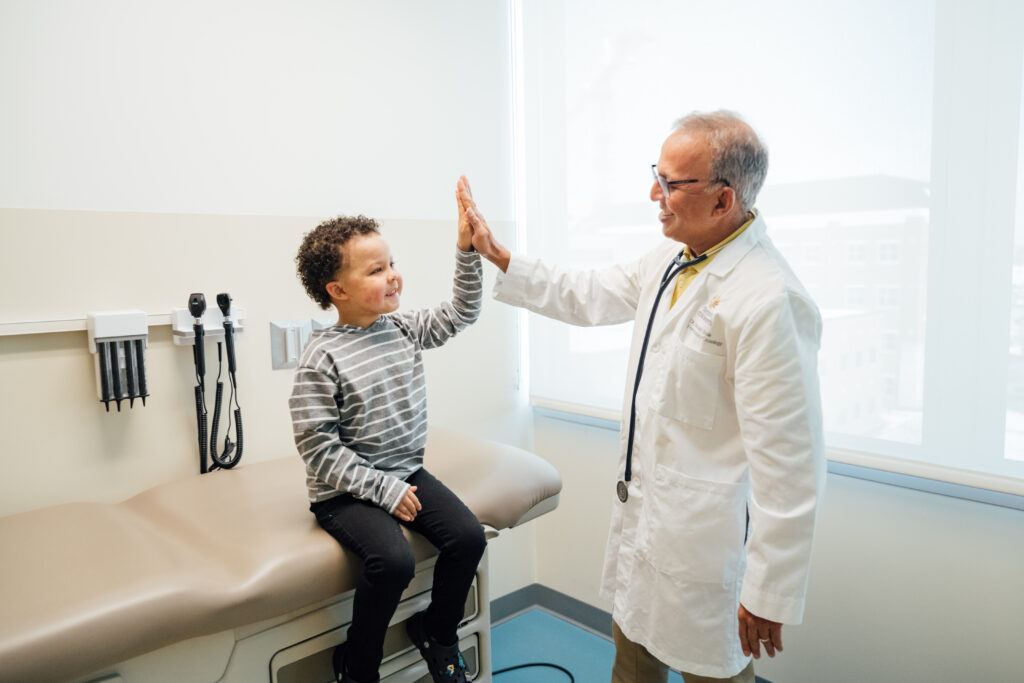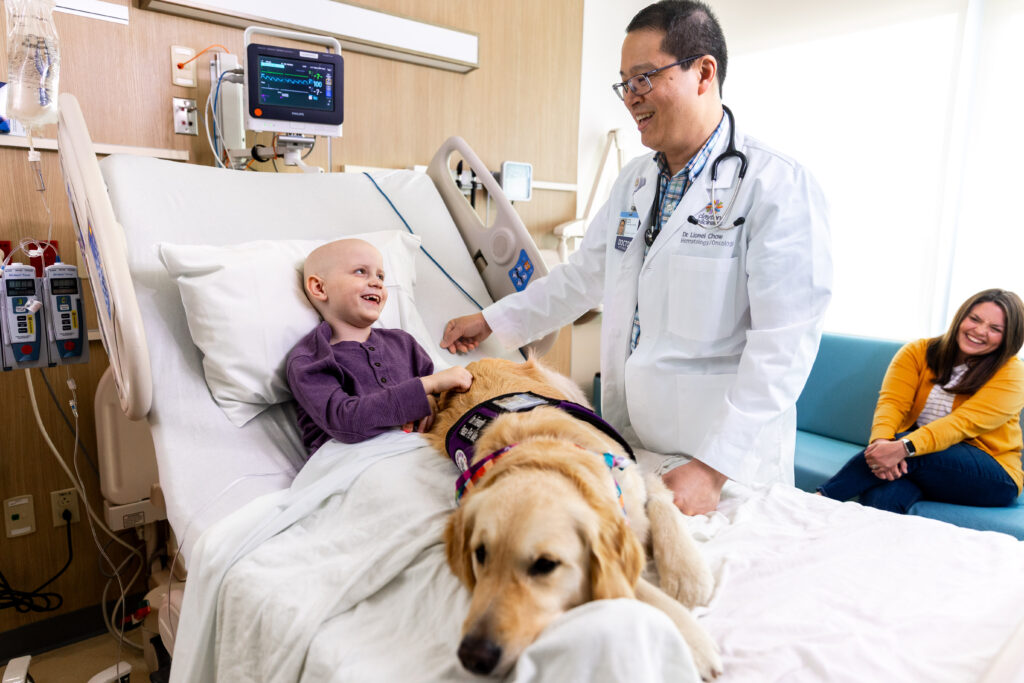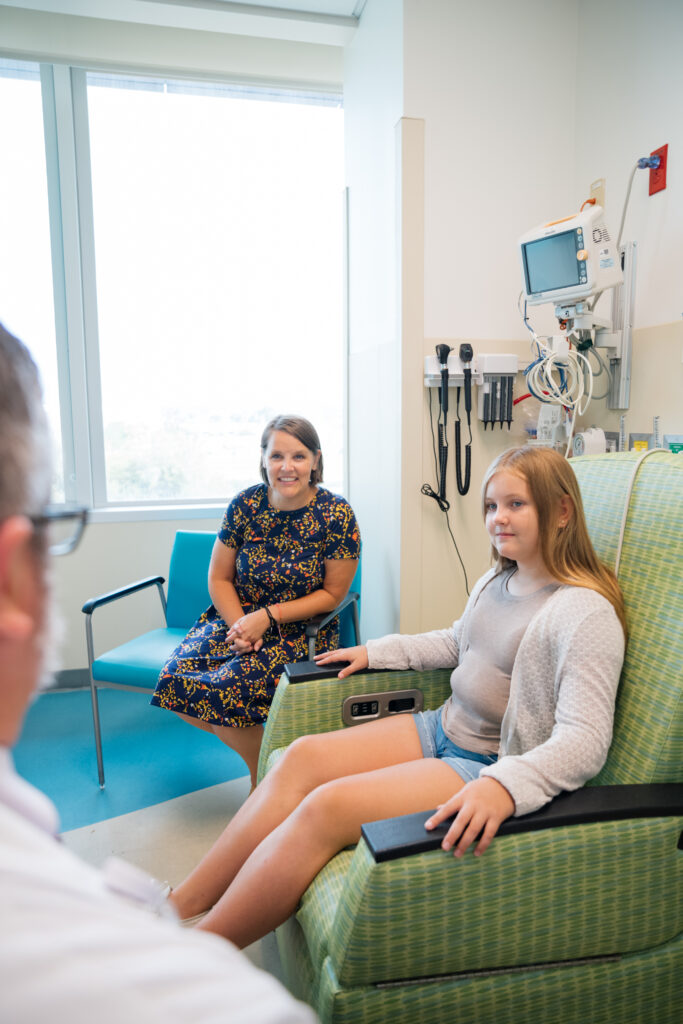pediatric hematology & oncology
Advanced care for children with cancer and blood disorders, delivered with compassion, connection, and support for the whole family.


what is pediatric hematology & oncology?
Pediatric hematology and oncology is the specialized care of children with cancer and blood disorders. At Dayton Children’s, our expert team treats a wide range of conditions—from leukemia and brain tumors to sickle cell disease and clotting disorders. But our care goes far beyond medicine. Families often become part of our extended family as their child receives care over months or years, with support tailored to every stage of the journey—medically, emotionally, and practically.
above and beyond cancer care
Taking care of a child with cancer can feel like an overwhelming responsibility. Our team is here to share the load by providing support every step of the way. We truly think of our patients and families as part of our family. From facility dogs to help comfort your child during treatment, to state-of-the-art care, the world-class cancer center at Dayton Children’s is here for your family.

our hematology & oncology specialists
Our pediatric hematology and oncology team includes board-certified physicians, nurse navigators, dietitians and more who focus solely on children with cancer and blood disorders. With exceptional expertise in everything from leukemia to sickle cell disease, our providers walk alongside families through every step of treatment. We build lasting relationships with our patients and their loved ones, and consider the patients and families that we treat part of our own.
- Jordan M. Wright, MD — Division Chief, Hematology / Oncology
- Caitlyn McComb, MD — Hematology / Oncology
- Lionel Chow, MD, PhD — Hematology / Oncology
- Mukund Dole, MD — Hematology / Oncology
- Rachael Courtney, DO — Hematology / Oncology
pediatric hematology & oncology conditions we treat
We work with children of all ages – from infants through young adults – who have cancer or blood disorders.
- Alpha thalassemia
- Anemia
- Astrocytoma
- Bleeding disorders
- Blood clotting disorders
- Bone and muscle (musculoskeletal) tumors and sarcomas
- Brain and spinal cord tumors
- Cancer
- Chronic Myeloid Leukemia (CML)
- Congenital amegakaryocytic thrombocytopenia
- Cyclic neutropenia
- Dyskeratosis congenita
- Ependymoma
- Ewing sarcoma
- Fetal anemia
- Fetal conditions
- G6PD deficiency
- Germ cell tumors
- Glioma
- Hemoglobin E or E beta thalassemia
- Hemophilia
- Hemostasis disorders
- Hereditary spherocytosis
- Hodgkin’s lymphoma
- Hydrops fetalis
- Immune thrombocytopenic purpura (ITP)
- Kidney tumors
- Langerhans cell histiocytosis
- Leukemia
- Liver tumors and masses
- Lymphoma
- Medulloblastoma
- Neuroblastoma
- Neutropenia
- Osteosarcoma
- Ovarian cysts and tumors
- Platelet disorders
- Port placement for chemotherapy
- Pyruvate kinase deficiency
- Red blood cell disorders
- Retinoblastoma
- Rh isoimmunization (Rh factor)
- Sarcomas
- Severe congenital neutropenia (Kostmann’s syndrome)
- Shwachman-Diamond syndrome
- Sickle cell disease
- Surgery to remove tumors and masses
- Thalassemia
- Thrombocytopenia, congenital or acquired
- Thrombocytosis
- Thrombophilia
- Thrombosis
- Thyroid cancer
- Transient erythroblastopenia of childhood (TEC)
- Tuberous sclerosis
- Vascular anomalies
- Von Willebrand disease
- White blood cell disorders
- Wilms Tumor (kidney cancer)
programs & clinics
Dayton Children’s department of hematology and oncology provides comprehensive programs and clinics to treat a wide variety of conditions and disorders.
cancer programs and clinics
Dayton-area families receive world-class care for a child with cancer right here at Dayton Children’s. We are a member of the Children’s Oncology Group, which ensures your child receives access to the same best protocols and clinical trials that they would have at other leading children’s hospitals.
Experienced pediatric hematologists/oncologists lead our multidisciplinary team, which includes nurses, a nurse practitioner, a child life specialist and a social worker. The team goes above and beyond every day to make sure that kids receive great care that is personalized to their unique needs.
Tumors of the brain and spine are highly specialized and require a different approach to care. Dayton Children’s collaborates with the Children’s Oncology Group, an international organization that specializes in the treatment of children’s cancer. This partnership gives you access to the most up-to-date research and treatment plans while receiving care close to home.
Children who are diagnosed with these tumors are at higher risk for behavior changes, learning difficulties, fertility issues and/or endocrine changes as a result of the tumor and treatment. We know this is a very stressful time for your family. We are here to help you both during and after your treatment.
The vascular anomalies clinic at Dayton Children’s Hospital is comprised of specialists from hematology/oncology, ENT, plastic surgery, pediatric surgery and interventional radiology.
Our comprehensive team has expertise in the diagnosis, management and treatment of vascular anomalies, including hemangiomas and vascular tumors.
Dayton Children’s was one of the first hospitals in the country to offer a long-term follow-up program for children who have survived pediatric cancer. This program is available to patients and their families from the time they complete therapy through adulthood. In the last eight years, the number of former cancer patients served by the program has more than doubled to nearly 250, a reflection of our high cure rates.
Patients start participating in the long-term follow-up program approximately five years after finishing therapy. We encourage them to continue coming for the rest of their lives, since some late effects of cancer treatment can show up well into adulthood. We welcome all pediatric cancer survivors, regardless of where they were treated for cancer.
Being told that your child has cancer is devastating to both the child and the family. Often, first thoughts are about treatment, which may include surgery, chemotherapy and/or radiation therapy. Although it may not be your first thought, an important part of treatment includes fertility preservation. Preserving your child’s fertility provides hope for their future. It allows them to one day have the family they’ve always wanted. We understand that fertility is very important for their quality of life in the years to come.
Even though the number of cancer cases grows each year, the number of survivors is also rising. There is a survival rate of over 80 percent in the pediatric and adolescent population.
At Dayton Children’s, we understand how important it is not only to plan the best treatment options with the highest quality care for your child, but also to plan for their future. Dayton Children’s Oncology department has collaborated with SpringCreek Fertility to provide reproductive and fertility options. We also have resources to help with the costs of preservation procedures. Currently, there are options in place for both males and females who have reached puberty. We are actively working to provide these services to younger children soon.
We are currently able to offer:
- Embryo cryopreservation
- Oocyte cryopreservation
- Lupron injections
- Sperm cryopreservation
If you have questions related to fertility, please call 937-641-3111 and ask for our fertility nurse coordinators
blood disorders programs and clinics
Dayton Children’s provides exceptional care for children with sickle cell disease, hemophilia and other blood disorders. Our pediatric hematologists/oncologists, nurses, social workers and other care professionals treat about 350 children each year, and provide strong support for families to help them manage their child’s condition at home.
One of the greatest strengths of our program is the personal relationships that develop between our team and the families we serve. We consider it a privilege to care for children for many years, watching them grow up and learn how to manage their condition effectively.
Some of the conditions we treat:
- Sickle cell disease
- Thalassemias
- Hemophilia
- Von Willebrand disease
- Platelet disorders
- Thrombophilia
Dayton Children’s is the only facility in the Dayton area to provide comprehensive care for infants, children and teens with sickle cell disease, sickle cell trait, thalassemias and other hemoglobin variants. Our program is called the West Central Ohio Comprehensive Sickle Cell Center, one of six that is funded by the Ohio Department of Health to provide care for children with sickle cell disease and support for their families.
The Hemostasis and Thrombosis Center (HTC) is a federally funded organization that specializes in the treatment of patients with both bleeding and clotting disorders. We are one of the 130 centers in the national network. We use a comprehensive care model. This means a multidisciplinary team of experts will work together to provide you and your family with the best care. This could include dietitians, social workers, and physical therapists. We will bring together the right team based on your child’s specific needs.
Hearing that your child needs a blood or marrow transplant can be scary and overwhelming. We want to make the next step as stress-free as possible. That’s why we have partnered with Nationwide Children’s Hospital for a one program, two campus approach to blood and marrow transplants.
together, we’re stronger
Nationwide Children’s is ranked one of the top ten children’s hospitals for treating childhood cancer according to U.S. News and World Report. It is only about an hour away and, the best part, all your care will return close to home at Dayton Children’s once the transplant procedure and recovery are complete.
We work closely together with Nationwide Children’s to create a personalized transplant plan, specific to each child. Your Dayton Children’s care team will guide and support you every step of the way. This includes attending your first meeting at Nationwide Children’s and consistently tracking your progress. It’s the best of both worlds: Your child continues to receive compassionate, familiar care from their team at Dayton Children’s, and will receive expert, personalized transplant care at Nationwide Children’s.
clinical research programs
Sixty years ago, children diagnosed with leukemia had only a slim chance of survival. Today, the survival rate for childhood leukemia is 96-98 percent. Forty years ago, the average lifespan for people with sickle cell disease was only 14 years. Today, life expectancy for these patients can reach 50 years and beyond. What accounts for these dramatic improvements? To a large extent, the answer is clinical research.
Clinical research studies, or “trials,” are designed to help scientists evaluate specific treatment plans. These trials are sponsored by different hospitals, companies and government agencies, and made available to patients who fit certain criteria. At Dayton Children’s, we strongly encourage families to consider participating in clinical research for childhood cancers and blood disorders. We know that the therapies children receive through these studies may benefit them today, and countless children in years to come.
other programs
When patients need to be hospitalized, they are admitted to the hematology/oncology unit on the hospital’s fourth floor. This unit provides specialized care for patients who are experiencing difficult-to-control pain, those who need a transfusion and those who are ill and need round-the-clock care.
Every day during “morning rounds,” one of our pediatric hematologists/oncologists will come to the patient’s room with resident physicians, the charge nurse, other nurses and a nurse practitioner. The team will go over any test results, talk about what will happen on the day ahead and answer any questions families may have.
During their hospital stay, patients receive comprehensive care from our doctors and nurses. They also may interact with a:
- Psychologist
- Registered dietitian
- Social worker
- Child life specialist
- Chaplain
Volunteers often come by to spend time with children and play games. Family members are always welcome to take a break in the family lounge, which features a large-screen television, a kitchenette and comfortable chairs. All hospital guests can take advantage of the hospital’s free wi-fi.
Discharge planning begins almost as soon as the child is admitted to the hospital. Our goal is to make sure families have everything they need when the child goes home, such as prescriptions, home care services and follow-up clinic appointments. If questions arise after the child is discharged, parents can call the clinic during regular hours. After hours, they can call the hospital operator and ask for the hematologist/oncologist on call.
Children’s Home Care of Dayton Care and Comfort program offers palliative care services to children with life-limiting and terminal illnesses. The staff of the Children’s Care and Comfort program understands the needs of children with life-threatening illnesses and the needs of their families. It is our goal to provide family-centered care that respects the dignity and uniqueness of every child and family.
Our comprehensive services make it possible for families to care for their seriously ill child at home. These include:
- Nurses with pediatric expertise on call 24 hours a day, seven days a week
- Infusion therapies
- Pain management
- In-home blood transfusions
- Intensive family support
- Interdisciplinary team case management
- Coordinator and advocacy with community resources
- A family support specialist is available to provide individualized services, including:
- Emotional support
- Parent education
- Sibling support
- Short-term family intervention
- Referrals and resources
- Bereavement support
Dayton Children’s pain management program manages a child’s pain during common medical procedures like IV insertions and blood draws, which are among the most frequently reported painful events in hospitalized children. No child should suffer when his or her pain can be decreased or relieved.
news and blogs
Stay up-to-date with the latest insights from Dayton Children’s Hospital. We’re always working to share helpful, real-world content for families navigating hematology and oncology care.
patient stories
During a difficult journey, it can bring comfort to hear from other families who have had similar experiences. These stories are here to do just that, and reassure you that we are here for your child and family every step of the way.
Explore how Dayton Children’s hematology and oncology team has gone above and beyond for kids just like yours.
for your visit
For all visits, please wear comfortable and loose clothing and bring:
- Your insurance information and photo ID
- Your child’s labs/blood work or imaging results (if you have it). You may send this by fax before your appointment to allow time for review to 937-641-5484.
- A list of questions
- Any required school or work forms
The appointment will be about an hour so the provider can develop a personalized treatment plan and answer all of your questions.
Thank you for trusting the Dayton Children’s hematology/oncology team with your child’s care.
Get checklists, resources, and helpful tips for before, during, and after your visit to Dayton Children’s—so you know exactly what to expect.
resources – hematology & oncology
patient resources
- Support services
- Hematology and oncology family guide – cancer
- hemostasis and thrombosis family guide – blood and clotting disorders
community resources
- CaringBridge.org: Create an account to share health updates, photos and videos with people who care about you.
- A Special Wish – Dayton : A Special Wish grants wishes for children 0-20 years old diagnosed with life-threatening conditions. Visit their website to refer a child.
- Flying Horse Farms: Located in Mt. Gilead, Ohio Flying Horse Farms provides a delightful camp experience free of charge to families and children with serious illnesses.
hours & locations – hematology & oncology
Our team is here to support your child’s health at multiple convenient locations.
we’re here when you need us
If your child has been diagnosed with cancer or a blood disorder—or you’re seeking expert guidance—you don’t have to face it alone. Our pediatric hematology and oncology team is here to support your family every step of the way with personalized care and compassion. Schedule an appointment online or call 937-641-4000.
